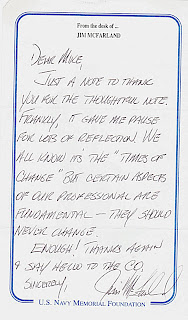Musings, leadership tidbits and quotes posted by a retired Navy Captain (really just a high performing 2nd Class Petty Officer) who hung up his uniform a bit too early. He still wears his Navy service on his sleeve. He needs to get over that. "ADVANCE WARNING - NO ORIGINAL THOUGHT!" A "self-appointed" lead EVANGELIST for the "cryptologic community". Keeping CRYPTOLOGY alive-one day and Sailor at a time. 2015 is 80th Anniversary of the Naval Security Group.
Wednesday, October 31, 2018
Sunday, October 7, 2018
Slackness in command
 |
| https://www.azquotes.com/quote/41598 |
The atmosphere of a Navy or a ship is created by the attitude of the officers. Officers are obligated to insure that each of their subordinates knows that the senior officers, and the Navy, do care about men as individuals. Each person in the Navy must have assurance that his progress, his training, his career, and his performance of duty are of concern to the Navy.
Slackness in Command. All major catastrophes in the loss of discipline in all organizations have been preceded by a general slackness in the command. The old saying that a taut ship is a happy ship is still true. The reason is that on a taut ship the officers and the men know where they stand and what is expected of them. There can be complete dependence on one's associates, for lack of reliability will be brought up with a round turn. On such ships, all men do a day's work, not just the conscientious ones. There are no soft billets in a taut outfit. The officers and the men are on the job and require others to be on the job. Chiselers and transgressors are promptly punished while their offenses are still minor.
From: General Discipline in the Navy, ADM A.A. Burke
Tuesday, October 2, 2018
Feedback to my CO in 2003.
Ensigns, don't try this at your command
This is a summary of my 360 degree feedback to a former commanding officer. Skipper, there's no doubt you're going to be a leader in the community; these things may help you.
- You are a great speaker. Be careful not to lose the feeling behind the words. Words have meaning; actions have consequences. Ensure your actions match your words. Some Sailors actually listen to every word. They can sense any hint of insincerity.
- Your command philosophy should be written down and distributed widely in the command. This is a huge reason for the CNO's success in the Navy. We all know where he's going and we talk about it. The command wants to follow you. Tell us where you want to go.
- Respect our time. Typically, ten or more people are always awaiting your late arrival at some function (staff meeting, wardroom meetings, dinners, graduations, etc). If people believe that you are willing to consistently waste their time, they will stop feeling guilty about wasting yours.
- Be consistent with your administration of military justice. It's easy to punish junior members in the command for trivial violations. Applying the same standards across the board does not always work. In fact, the more senior the individual is, the more accountable they should be held for their action or inaction. Everyone is watching and judging.
- When senior officers visit the command, maximize their exposure to the junior Sailors of the command. They will benefit the most.
- Take your junior officers, Chiefs, and Sailors to lunch or simply go have lunch with them in their mess. Everyone will learn a lot, especially you.
- Invite your key command leaders to your home for a social event so they can see how it's done. Juniors need to see how their seniors do this. It's part of the learning process.
- Share information with your department heads. It is astounding how much information a commanding officer is exposed to and that is not shared with the department heads. Distributed information is enormously powerful. Your department heads can keep a secret if there is a requirement for secrecy. Trust them.
- Don't play favorites with members of the wardroom. It hurts the wardroom and it hurts you.
- Focus your calendar on the command 's mission. Ceremonial events and public relations are important, but your time should be spent on those areas the commanding officer can directly influence for the greatest benefit to the command's mission.
Stay tuned to this blog for the 360-degree feedback I received from everyone following my command tour. It's a very interesting and eye opening experience.
Monday, October 1, 2018
Subscribe to:
Posts (Atom)


